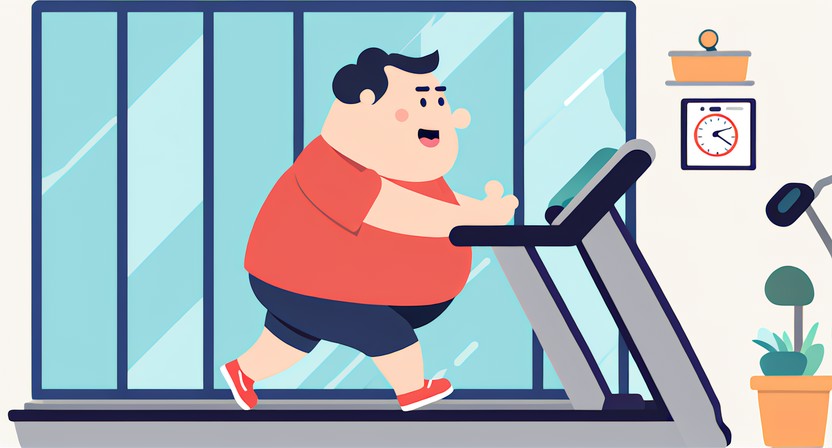Why Am I Not Shedding Weight Despite Regular Exercise?
Discover why you're not shedding weight despite regular exercise. Dive into possible causes & solutions for weight loss plateau in this informative article.

It's a question that has pulled of hair, muddled minds and even sparked demotivation in countless individuals: "Why am I not shedding weight despite regular exercise?" You've been waking up before sunrise, trading your favorite latte for a fruit smoothie, and swapping couch time for gym time – and yet, the stubborn scale seems to enjoy playing a cruel joke on you. Don't lose heart! Here, we delve into the possible causes and solutions, providing you the motivation and expert tips to jumpstart your weight loss journey anew.
Balancing the Energy Equation
Maintaining, losing, or gaining weight is essentially an energy equation—the balance of calories consumed versus calories burned. Regular exercise helps burn more calories, which ought to aid weight loss, but if you're consuming as many calories (or more) as you're burning, you'll find the needle on the scale unaffected.
Pay attention to your diet and consider keeping a food diary. You'd be surprised at how we often underestimate our calorie intake. The culprit could be anything - an innocent-looking sugary drink, "healthy" snacks with high trans-fat content, or large portion sizes. And remember, it's about consuming nutrient-dense calories, not empty ones. So, while counting calories is important, ensuring they come from a balanced mix of proteins, complex carbohydrates and healthy fats is even more crucial.
The Compensatory Pastry Phenomenon
Sweaty, tired, but feeling triumphant after a workout? Celebrating with a treat seems like just the reward you deserve, and one your body is craving. This is what we call the 'Compensatory Pastry Phenomenon' – you're simply negating the calories burnt with an equal (or more!) intake of rewarding food.
Remember, most foods contain a significantly higher amount of calories than we can burn in regular workouts. It's much easier to eat 500 calories than to exercise them off. Train your mind to separate rewards from food. Substitute foods high in sugars and fats with healthier alternatives, like a fresh fruit or probiotic yogurt.
The Importance of Building Muscle
Lace up, hit the gym, sweat on the treadmill – repeat! If this is your exercise regimen, maybe it's time for a change. Cardiovascular exercises are crucial but focusing on them solely could be hampering your weight loss goals. Muscle mass burns more calories at rest than body fat.
Adding strength training to your routine can aid in building muscle mass, which in turn will rev up your metabolism. Exercise variety will also help in targeting all muscle groups and combat exercise monotony, making your fitness journey more fun and fruitful.
The Role of Stress and Sleep
Exercise, diet, sleep and stress - they're all parts of a big jigsaw puzzle. Knock one piece out of position, and the image gets distorted. Chronic stress and insufficient sleep can increase the production of cortisol, a hormone that signals your body to conserve energy and store fat, particularly in the abdominal area.
Create a sleep-positive environment and stick to a regular sleep schedule. Try relaxation techniques, like meditation or yoga, to manage stress effectively. A balanced life can indeed tip the scale towards your desired weight.
Plateauing Progress
Progress isn't always linear. Weight loss plateaus are common after you've lost some weight, due to decreased metabolism and changes in hormones that regulate weight. But, plateaus are not dead ends!
Shake things up - change your exercise and diet routine. Add some interval training, try a new sport or fitness class, switch to whole foods from processed ones, or consider shifting the timing of your meals. Plateaus are an opportunity for you to challenge yourself and spice up your plan.
Listen To Your Body
Each body responds differently to exercise and diet changes. Genes, hormones, and age all play a part in weight loss. Be patient with your body. Losing a pound or two a week is considered healthy and sustainable. Rapid weight loss can be unsafe and is more likely to be regained.
The Triumphs Beyond the Scale
While the scale is easy to measure, weight doesn't always reflect the complete story. Maybe you're losing fat and gaining muscle, which is great but won't necessarily show on the scale. Non-scale victories, such as better sleep, improved energy levels, lower blood pressure, better fitting clothes, or simply feeling happier and healthier, are the unsung hymns of your fat-loss journey.
To Conclude
Exercise and diet need to happily coexist in your weight-loss plan. The solution isn't to exercise more harshly, but to exercise and eat smarter. We've armed you with a wealth of information - understanding these underlying principles could truly be your game-changer!
So, lace up your shoes, pack a punch into your routine, relish your diet, and embark on this journey with a newfound understanding and a brighter smile. Remember, scales don't reflect your willpower, strength or determination. You've taken the decision to lead a healthier life, and that's a victory in itself! So don’t resign to the stubborn scale. Instead, let’s begin a crusade toward health, happiness and sustainable fitness — every small step is a leap forward!